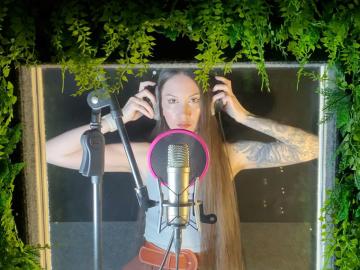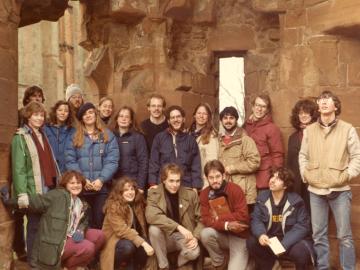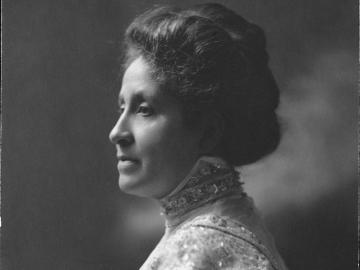Oberlin Alumni Magazine
Writing The Future
August 13, 2024
Serena Zets '22

The billboard-sized screen ads Netflix used to promote the 2023 movie Leave the World Behind were impossible to miss last fall. That’s partly due to the cast: The film—an adaptation of the widely lauded novel by Rumaan Alam ’99—stars Julia Roberts, Ethan Hawke, Mahershala Ali, and Myha’la Herrold. Leave the World Behind was an immediate hit, and it currently ranks in the top 10 of Netflix’s most popular English-language films of all time.
Alam’s novel, a finalist for the 2020 National Book Award for Fiction, also demanded full attention. Leave the World Behind follows two families navigating challenging dynamics of race and class as an unfamiliar and unnamed global disaster threatens their ways of living. The book is rife with fear and paranoia about the catastrophe that begins to consume the characters’ lives. Sound familiar? Leave the World Behind was published in October 2020, when ongoing racial tensions and anxiety prompted by the COVID-19 pandemic dominated the country’s conversation. The book read like a dystopian account of what could happen to us if we mishandled the challenges of the present day.
Much has happened in the nearly four years since Alam published Leave the World Behind. These days, he spends his time in his writing studio and office, located inside a quintessential Brooklyn row home. Natural light floods the space, illuminating the walls of built-in bookshelves holding hundreds of books. Alam says he read 114 novels in 2023 and is working his way through the canon of great American fiction, a journey that’s led him to many unexpected favorites, including Don DeLillo’s Underworld. There’s a beautiful silk panel propped against a wall, a record player accompanied by boxes of records, and curated tchotchkes from the Leave the World Behind movie junket. Alam also has multiple copies of the manuscript of his forthcoming novel, Entitlement (out September 17 via Riverhead), piled next to his desk. The room is one of tasteful abundance; no space is wasted, and everything has its place.
“What a thing to do for your job, to sit at your desk in this comfortable, beautiful place,” Alam says. He and his husband, photographer David Land, began renting this space two years ago after living and writing on top of each other and their two sons throughout the pandemic. Alam is chatting during the stretch of winter when he’s eating so much citrus, “it’s like I’m afraid of getting scurvy,” he says playfully. Spring will come soon, but for now, he offers up strong, steaming black coffee that provides needed warmth.

Alam navigates conversation with the kind of ease possessed by Oberlin students and professors; our comfort reminds me of being back in my Asia House apartment talking to an old friend about a particularly impactful play, opera, or concert we had just witnessed on campus. He moves between jokes, intimate observations, and universal assertions, speaking with familiarity and expertise about everything from the state of our collective cultural consciousness to his thoughts on Jonathan Glazer’s films Birth and The Zone of Interest to his enduring reliance on his cell phone. “It’s really hard to imagine leaving your phone at home and having the day you need to have,” he shares. “It’s really seductive. It’s as well-designed as an Oreo cookie.”
As we move beyond our initial subjects of inquiry, the dialogue resembles the profoundly earth-shattering conversations I had inside and particularly outside of the classroom at Oberlin: at co-op meals, amongst peers at student protests, on long walks through the arb, in the pews of Fairchild Chapel, after last call at the Feve. In conversation and in writing, Alam draws you in and makes you feel at home.
Right after earning a degree in creative writing, Alam started cultivating his home—and artistic tastes—in New York, moving to Brooklyn for an opportunity at Condé Nast. In the subsequent two decades, he rose through the ranks of literary New York by working in media and continuing to write fiction. In fact, Alam had published two acclaimed novels, 2016’s Rich and Pretty and 2018’s That Kind of Mother, when he landed a seemingly dream job in 2018—editor of special projects at The New York Times Book Review.
Alam ended up being in the job only briefly, but his decision to leave secure employment at the Times turned out to be the right one, as it led him directly to Leave the World Behind. He had been tinkering with a story idea before shelving it to accept the job at the Times. Upon quitting, Alam turned back to his idea. That evolved into his first draft of Leave the World Behind, which he subsequently sold in a seven-way auction before the pandemic. Similarly, the book’s film adaptation rights sparked a bidding war before landing at Netflix in July 2020, ahead of the book’s fall publication. A former U.S. president’s cosign can’t hurt either: Barack and Michelle Obama co-executive produced the film through their production company Higher Ground Productions. (Alam was also co-executive producer.)
The purpose of the education is to teach you how to educate yourself. To teach you curiosity and how to sustain that. To teach you rigor.
Rumaan Alam '99
For the majority of the months leading up to the film release, the movie’s stars couldn’t do related press due to the 2023 strike of the Screen Actors Guild-American Federation of Television and Radio Artists (SAG-AFTRA). Alam also ended up doing a lot of the promotional interviews typically reserved for the actors or directors. While novelists don’t usually take on that task, Alam was game to do it. “I’m not the person they [the press] want to talk to,” he says humbly. “They want to talk to Julia Roberts. I get it, who wouldn’t want to talk to Julia Roberts?”
The safety net provided by the Netflix deal gave relief to Alam as everything else remained uncertain; in fact, he says selling the Leave the World Behind adaptation rights to Netflix got his family through the pandemic, as he and his husband found their work as freelance artists on pause or drying up. Alam also began working on Entitlement in October 2021 and continued developing and editing it throughout the Leave the World Behind adaptation process. “I’m glad I had that place to be while the movie was happening,” he says. “It’s a weird thing to be grounded in a fictional world, but that’s an accurate way of putting it.”
A Time For Questions
At Oberlin, Alam was encouraged to use his writing to ask and explore incisive questions about himself and the world, a practice of inquiry that still undergirds all of his work, including Entitlement. “I’m sure lots of bad writing came from that because that’s what you turn out when you’re young,” he says. “Unless you do that bad work, you’ll never go anywhere.”
But Alam draws a straight line between Oberlin and his enduring—if constantly evolving—sense of curiosity about experiences beyond his own. For example, while Alam is gay and Bengali, none of the characters in his three published novels (nor Entitlement) are. He credits Oberlin as the place where he honed his literary discipline and writing practice.
“The purpose of the education is to teach you how to educate yourself,” he says. “To teach you curiosity and how to sustain that. To teach you rigor. It was at Oberlin where I thought, ‘Everyone here is really smart. They know all this stuff; they care about all this stuff.’ My fellow students struck me as having these profound political consciences and ideas about the world that had never occurred to me. I feel like that’s when you should be learning that stuff, at 18, 19, and 20.”
Living and working in Oberlin was his first taste of adulthood. As a creative writing major who went to part-time status for his final three semesters, Alam used his time outside of the classroom to explore his own identity through writing and forming deeper bonds with the town than most Obies are able to. When not writing or attending class, Alam worked as a nanny for the family of Randolph Coleman, professor emeritus of composition in the conservatory, and at the Feve when it was a coffee shop; in fact, one of his “oldest and dearest” friends, Lauren Whitehouse ’00, manages the Feve today. “It was the first home I made for myself independent of my family,” Alam says of Oberlin, “and I think that’s why I feel this attachment to it.”

When contrasting Oberlin of the 1990s with Oberlin of the current day, we turn our discussion to the tidal shift in the national conversation around queer identity that occurred in that timeframe. Colleges—specifically open-minded liberal arts schools like Oberlin—have long served as critical sites of identity articulation for queer students. While some current students had opportunities to explore queer identities and formally come out if they chose to prior to reaching Oberlin, for queer writers of Alam’s generation, college was often the first place they were not only acknowledging their queerness, but expressing and writing about it too. “Like a lot of queer people, I didn’t really exist until I was at Oberlin,” Alam says. “In some ways, I feel a much more emotional tie to Oberlin as a geography than I do to the place I grew up.”
Almost 25 years removed from his time at Oberlin, Alam finds himself reminiscing on the uniqueness and expansiveness of the education he received. “Now I have a 14-year-old, and we are weirdly staring down the idea of what he will do in his post-secondary education,” he says. “I’ll admit I have this bias towards this four-year liberal arts collegiate tradition that’s so devalued in our culture now. It’s fascinating because it’s not about going to learn these sets of facts that will carry your career preparation. It’s the idea that there’s a value in going to study sociology or English literature or the Russian language, and then you can go on and become an attorney, a scientist, whatever you want, but you have the appreciation for the ideas of the world. It’s exciting.”
New Worlds to Build
With promotion for Leave the World Behind behind him, Alam is now focusing his attention on Entitlement. The novel reflects his long-held interest in the role money and class play in society; it explores issues of race while also sharply analyzing money and economic stratification. Set in 2014, Entitlement follows the interpersonal relationship between Brooke, a 33-year-old Black woman, and the 83-year-old white billionaire whose foundation she goes to work for; as it happens, he is giving away his vast fortune before he dies. “It’s about money, really,” Alam says about the book. “What is money? It’s like a distortion field; it’s a value system. You participate in it without your approval. It’s the oxygen; it’s the atmosphere of contemporary life. There’s no escaping it.”
His commitment to writing about characters who come from backgrounds and communities different from his own is rooted in the idea that our observations, not just our experiences, are at the core of who we are. “I want to absent myself as much as possible” from Entitlement, he says, “but people who know me, like my husband, who just read my new book, he said to me, ‘Wow this is just about you.’ And I was like, ‘It’s just about me because it’s all I have. I have nothing else.’”
At the same time, Alam knew there was some merit to Entitlement once its fictional world began to bleed into his real one. He found himself waking up in the middle of the night to scribble down notes about where the plot should lead, and he noticed that things in the world around him reminded him of Brooke. “When it’s taken over my life to that extent,” Alam says, “my feeling is, ‘OK, there’s something here.’”
This immersion speaks to his belief that the characters and worlds he builds within his novels are all him. “It’s all you have,” he says. “You don’t have anything else to work with; you only have the self and every observation you’ve ever made that you feel really confident in. You see absolutely everything through the lens of the self. That is the raw material for writers and probably most artists. Rather than trying to outrun that, I am comfortable with that.”
Though the success of Leave the World Behind has opened more doors for Alam—beyond Entitlement, he has another book coming out with Riverhead in the coming years—he doesn’t dwell on his past projects. “There’s a ton of attention right now because a movie is exponentially more significant in the culture that we live in now than a book is going to be,” he says. “I’m proud of the movie, and I’m thrilled about it. But it’s at your own peril to think about something like that being too intimately related to what you’re really doing.”
What’s next, then? As always—writing more books that ask questions of readers rather than authoritatively giving them all the answers. “People are really afraid of nuance and complexity, but reality is more complex and nuanced than it is not. They say, ‘How dare you think expansively about gender, about sex, about violence, about history? How dare you?’ I dare, and you dare, and everyone reading honestly does dare—and I think that’s good. I still believe in that.”
Serena Zets ’22 is a Washington, D.C.-based freelance journalist and essayist. She is a regular contributor to Washington City Paper and has been published in Lux and Hooligan magazines and on the websites Apartment Therapy and 100 Days in Appalachia.
This story originally appeared in the Summer 2024 issue of the Oberlin Alumni Magazine.
Tags:
You may also like…
Voices Carry
March 13, 2025
Grammy-certified vocalist and viola da gamba player Ari Mason ’14 finds her niche in video games, films, and a vocal library.
London Calling
March 13, 2025
For Tracy Chevalier ’84, the Oberlin-In-London program was a magical, intense period of cultural and intellectual stimulation. As the beloved study-away experience celebrates 50 years, the New York Times best-selling author looks back on the semester she spent studying and living in London.
A Banner Held High
February 26, 2025
In 2018, Oberlin College named its main library after civil rights leader Mary Church Terrell, Class of 1884.


